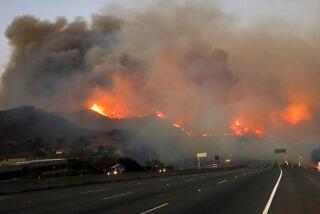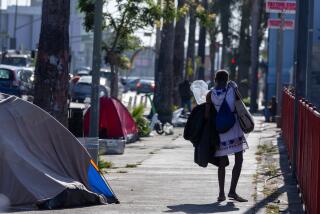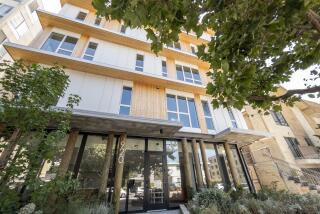L.A. to seek a tax to fight gangs
Desperate to stem the rise of gang violence in Los Angeles, the City Council agreed Tuesday to draft a ballot measure that would impose a parcel tax to raise $50 million or more annually for intervention and prevention programs.
However, council members said it was unlikely the proposal would go onto the ballot until next year, skipping the municipal election in May.
Also Tuesday, City Atty. Rocky Delgadillo released his plan for reducing gangs, which includes a call for school uniforms to be required for all Los Angeles Unified School District students, legal action to shut down the headquarters of the 10 worst gangs, and expanding his assignment of prosecutors to every police station and to neighborhoods around gang-plagued schools.
Delgadillo also said he would seek to expand the city attorney office’s truancy program to numerous of middle schools, obtain stay-away orders for those who do not live in the neighborhoods they terrorize and push for legislation to increase penalties for gang-related crime.
Councilwoman Janice Hahn, who wrote and championed the proposal for a parcel tax to fight gangs, said action was needed because of the 267 gang-related homicides last year and the 14% increase in gang crime citywide.
“We have a major crisis in the city of Los Angeles,” Hahn said. “I think the time is right that we ask the voters of Los Angeles if they would be willing to partner with us for a sustainable comprehensive approach to gang violence.”
After a sometimes emotional debate, the council voted 13 to 0 to direct the city attorney to draft language for a ballot measure.
Another vote will be necessary to put it to voters.
Hahn reluctantly agreed to remove a commitment to the May election from the council resolution after some of her colleagues said it was likely to fail because it needs two-thirds support to pass and voter turnout is expected to be low.
Hahn represents parts of South Los Angeles, including the Harbor Gateway neighborhood that has seen two killings of African American residents by Latino gang members in as many months.
One was the Dec. 15 slaying of 14-year-old Cheryl Green. A Mexican immigrant was fatally shot Dec. 5 by a youth who witnesses believe was black, although his identity was shielded by a hood and mask.
“I have felt overwhelmed by the gang violence in my council district. I have felt desperate,” Hahn told her colleagues, her voice cracking with emotion. “There was a huge part of me that just did not want to wait.”
Hahn said she believes voters would support a parcel tax, which she estimated would cost property owners a flat $5 per month.
The vote to draft the ballot measure was particularly striking given the council’s leeriness of tax hikes following two recent failures. City voters refused, in November 2004, to go along with a countywide sales tax increase to pay for more police, and they rejected a $1-billion affordable-housing bond last fall.
Hahn would like to see the measure go to voters early next year and is hoping that the state Legislature will act to move the presidential primary election forward to February. Meanwhile, she hopes to secure additional funds for city gang prevention programs during council budget negotiations in May.
Councilman Herb Wesson raised the need for a compromise on the timing of the election, telling his colleagues that his considerable political experience told him a ballot measure wouldn’t win in May.
“People in our community are depending on us to do this right,” Wesson said. “Let’s not just deliver a ballot measure, let’s deliver a winning ballot measure.”
Some council members objected that a May vote would not provide enough time to digest and act on a study released last week by the Advancement Project that recommended an overhaul of intervention and prevention efforts.
The study said the city has failed to reduce gang violence, in large part because it lacks coordination and focus for the 23 scattered anti-gang programs it currently funds to the tune of $82 million a year.
Councilman Tony Cardenas, who leads a council committee on gang programs, said the city has not determined how much money is needed to get the job done, and he worried that $50 million might not be enough.
Councilman Dennis Zine, although he voted to draft the tax measure, questioned whether voters would support it less than a year after the council increased trash fees to pay for 1,000 more police officers.
The concern about overburdening taxpayers was raised by Veronica Perez Becker, a vice president of the Central City Assn.
“Before imposing more taxes on your constituents, we urge you to take a careful look at the collective impact of recent tax increases,” Becker told the council.
In a telephone interview, Jon Coupal, president of the Howard Jarvis Taxpayers Assn., predicted the council would face a tough time selling another tax hike to voters. “They have an uphill battle,” he said.
In recent years, two other California cities -- Santa Rosa and San Bernardino -- have won voter approval for tax increases to combat gangs. In both instances, however, the added charges also helped pay for more police.
steve.hymon@latimes.com
More to Read
Sign up for Essential California
The most important California stories and recommendations in your inbox every morning.
You may occasionally receive promotional content from the Los Angeles Times.











